Christian Horner: 2014 a race between engine manufacturers
Two days of testing, 11 laps completed. It’s probably not the start to 2014 he had in mind, but for now at least, Red Bull team principal Christian Horner is hiding any concern well. Horner knows the calibre of his team and his drivers - including new arrival Daniel Ricciardo - but there is one big unknown in their new RB10 car: a hybrid, V6 turbo power unit. We caught up with Horner in Jerez to find out why he believes Renault will be critical to Red Bull’s success in 2014 - a season in which he says power units, and in particular their reliability, will be decisive…
Q: Christian, what does it mean missing almost two days’ running at such an important test?
Christian Horner: It means that we have 10 days instead of 12. That’s the mathematical situation. And looking at how many laps others have done over these two days, I would say that we are pretty much sitting in the same boat, as it doesn’t make so much difference having done 12 or 60 laps. That rather marginal difference will not break the camel’s back.
Q: But how frustrating is it not really getting anywhere here in Spain, knowing that the next two tests are in Bahrain which - unlike Jerez - is quite a distance from all the factories?
CH: Well, to be honest this Jerez test was always meant as an engine verification test in terms of sorting out some of the mapping issues. In reality it’s to get the power units going. Our expectations coming into this test are purely system checks - the proper testing will be in Bahrain.
Q: On day one Seb did only three laps - and today only eight laps. Are you considering giving him more time in the car and cutting Daniel’s slot short?
CH: It will stay as planned: two days Seb and two days Daniel. That means that Daniel is taking over tomorrow.
Q: Given the overall lack of running, is there a demand from the teams’ side to extend this test into Saturday?
CH: Not at the moment.
Q: The season begins in six weeks’ time, with big question marks hanging over all the cars. What is the state of affairs at Red Bull Racing?
CH: So far it still looks good. It’s been a busy winter. We’ve built the most complicated car in the history of Formula One in the shortest possible time. There are about 40 percent more drawings involved in the RB10 than in the RB9, so the whole team has done an incredible job. Hats off to every department.
Q: You are the team that has the most to lose. How well prepared are you in terms of minimising loss?
CH: We never think about losing. What we’ve achieved in the last few years is so remarkable that the word losing is not in our vocabulary. In this business you’re only as good as your last race and in our last race we finished first and second in Brazil. So our focus is on the next race in Melbourne - and having that strong team makes things look pretty positive.
Q: What were the biggest fears bringing the new car to the track?
CH: The power unit is such a fundamental change and so complicated that it is a game changer in Formula One. We will be relying extremely heavily on our engine partner. Power unit and reliability will be the decisive factors this season.
Q: The last big rule change in F1 racing was in 2009. Then there was suddenly one team - Brawn GP - that got it ‘righter’ than anybody else. Could that happen again?
CH: Unlikely, as the chassis rules aren’t so different. The power unit is the massive change - and where the opportunity lies. That’s why Renault is so critical to our success this year.
Q: That sounds like this season is a race among the engine manufacturers…
CH: In many respects, yes.
Q: What did Adrian Newey tell you about the car? Is it another masterstroke?
CH: Ha, it is still far too early. You definitely see that it is an Adrian car - from the way the car is packaged, from the aesthetics. It is a very pretty car compared to some of the solutions that other teams have brought. It is in the line of all the RB cars.
Q: If the RB10 is in the Red Bull Racing tradition, how was it possible to fix one part the wrong way as Seb mentioned yesterday?
CH: These new cars are so complicated and complex that such a situation can happen. Errors are part of the human nature.
Q: A lot has been said about the wisdom of the huge 2014 changes in light of the current economic climate, but now the changes are running. Will Formula One racing be better for them, or would you love to go back to 2013?
CH: What I think is that you will see more random results. You will see a very expensive Formula One this year because these rule changes are hideously expensive. What effect it will really have on the racing we will have to see.
Q: The V8 sound - one of the main characteristics of F1 racing in recent years - is not there anymore. Will you miss that?
CH: If I am totally honest the sound of the engine was part of the DNA of Formula One. It is probably what hits you first when you attend a Grand Prix, so we are losing that element. But I also know that we will quickly adjust.
Q: What about the fans? Will they also adjust quickly?
CH: If we provide good races, yes. Good wheel-to-wheel fights. Men and machines at the limit!
Q: You are going into the season with a four-time world champion paired with a rising star. How do you see that partnership working now that you have witnessed Daniel over the past few weeks?
CH: The impression of Daniel is very, very positive. He is quick and has a very good attitude - and he’s laid back. That means a totally different dynamic in the team, and, most refreshingly, he is enjoying every minute. Of course he is also very keen to learn from Seb.
Q: Is he a race winner?
CH: I don’t see any reason why not. But time will tell - if we can provide him with a competitive car.
Q: The cost-cutting issue is still a difficult topic. There seems to be only one thing that all teams agreed on: to skip the lavish car launches…
CH: Ha, we only participated in lavish car launches once. That was last year when Infiniti became our title sponsor. Other than that we’ve never believed in lavish car launches. Our approach has always been: cover off and get on with it! But let’s be serious: costs in Formula One are significant this year. There are a lot of talks going on. We have to see that we skip unnecessary costs.
Q: Where?
CH: I think the timing of the engine introduction is perhaps an unnecessary burden on all the teams, but now it is what it is. And it is the same now for everybody. The teams had to support those rules, so it is impossible to point fingers. Now we have to get on with it.
Q: Coming to that power unit, it is year one of a dramatic change and you are limited to just five power units per year - without any reference on how these engines will behave in racing mode. Is that common sense if there is the chance that some teams will have used up their allocation way before the last race?
CH: Well, some teams will end up using more than five - and that comes with a penalty. That might have consequences for the constructors’ championship - but then with the double points, that keeps your chances alive! (laughs)
Q: Is there a correlation between the number of engines and the double points at the end of the season?
CH: No. Bernie Ecclestone is very keen to keep the championship alive to the last race, as it is important for the fans. So one thing has nothing to do with the other.
Q: After your first taste of the new technology, how do you think the season might unfold?
CH: As I said before, it will be a race between the engine manufacturers and reliability will be a critical factor. It will take a few races for things to settle down as strategically the races will be very different with the fuel restriction. My guess is that by the time we come back to Europe for the Spanish Grand Prix, probably even a few races later, a pattern will emerge. But whenever this is, our target is to defend both our titles.
Next Up
Related Articles
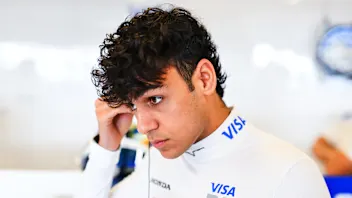 Marko ‘believed in me when others didn’t’ – Lindblad
Marko ‘believed in me when others didn’t’ – Lindblad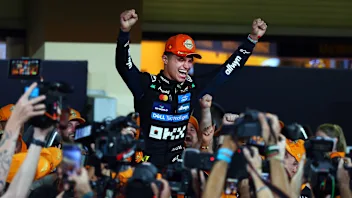 UnlockedQUIZ: 10 questions on the new World Champion Lando Norris
UnlockedQUIZ: 10 questions on the new World Champion Lando Norris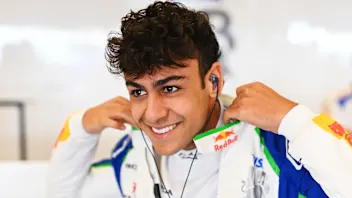 Lindblad's car number confirmed for rookie season
Lindblad's car number confirmed for rookie season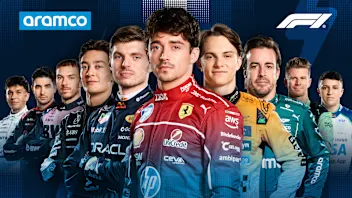 Power RankingsWho did our judges rank as the best F1 driver of 2025?
Power RankingsWho did our judges rank as the best F1 driver of 2025? 3 inspiring individuals share their paths to working in F1
3 inspiring individuals share their paths to working in F1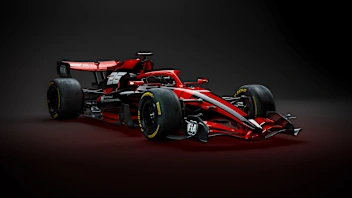 GALLERY: Check out renders of the innovative 2026 car
GALLERY: Check out renders of the innovative 2026 car